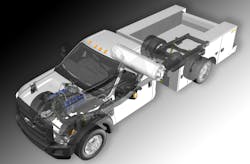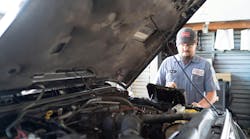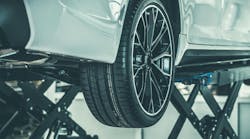Performance is critical for work trucks. It should also be a focus area for their fuel, including alternative energy options. Propane autogas, an emissions-reducing, low carbon, economical fuel, meets this demand.
Then and now
Propane autogas vehicles have been around for well over a century. But in the last decade, innovations have greatly improved the technology. The vapor-carbureted systems of the past have been replaced by modern liquid fuel injection systems. In a liquid system, liquid propane autogas is injected directly into each cylinder’s intake port. The liquid fuel vaporizes in the cylinder, cooling the air and resulting in no loss of horsepower, torque, or engine performance. With propane’s octane rating of 104, the engine is “detuned” to match the gasoline horsepower and torque numbers.
Many equipment suppliers manufacture propane fuel systems. ROUSH CleanTech’s dedicated liquid propane autogas fuel system integrates into Ford commercial medium duty Class 4-7 trucks. The fuel lines follow the original equipment manufacturer’s routing, and the fuel tank generally replaces the standard tank location. The system delivers propane autogas to the engine in liquid form.
Fuel system components
ROUSH CleanTech’s anodized aluminum fuel rails operate under the varying temperatures of liquid propane autogas. The fuel rail pressure control module improves vehicle start-up times, lowers start-up emissions, and provides consistent power. The propane fuel tank meets ASME certification standards.
It’s designed and manufactured to be 20 times more puncture-resistant than gasoline tanks and is assembled in our plant in Livonia, Michigan.
The design of the industry-standard quick connect fill valve allows for safe passage of liquid propane autogas into the vehicle. It also includes a check valve to prevent fuel leaks. The fuel lines, made of high-durability stainless steel to handle varying temperatures and pressures, are designed to route through the factory line locations.
ROUSH CleanTech reprograms Ford’s on-board computer that controls the engine to allow the vehicle to operate properly on propane autogas. Fuel injectors inject liquid propane autogas into the engine for ignition.
Propane truck fleets
Advancements in propane fleet vehicle technology have improved to where thousands of fleets across the nation rely on them to meet their corporate needs. “Our top priority is to operate a clean and safe fleet,” said Peter DeVito, CEO of dnata catering USA, one of the world’s largest air service providers. “With propane vehicles, we reduce emissions without sacrificing safety or performance.”
Jason Lee, general manager of HACOR, agrees, “The versatility and reliability of our propane vehicles allows us to operate our standard delivery and operating methods but with a low-emission fuel.” HACOR delivers up to 15,000 airline meals per day out of Los Angeles International Airport.
The automotive industry will continue to develop clean and economical propane vehicles to meet and exceed the needs of a work truck.
Information provided by ROUSH CleanTech


